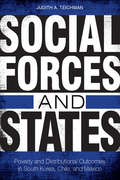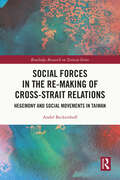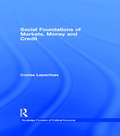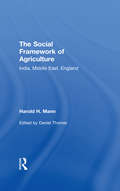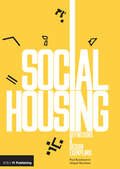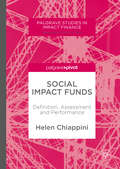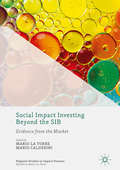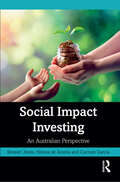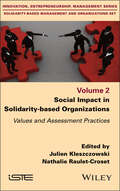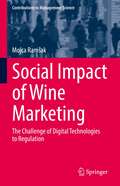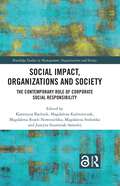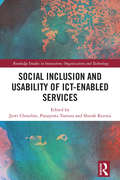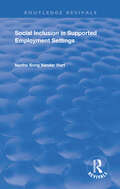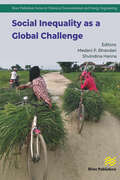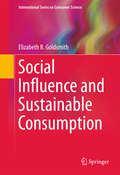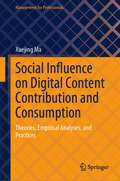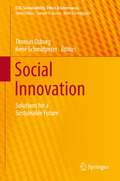- Table View
- List View
Social Forces and States: Poverty and Distributional Outcomes in South Korea, Chile, and Mexico
by Judith A. TeichmanWith the failure of market reform to generate sustained growth in many countries of the Global South, poverty reduction has become an urgent moral and political issue in the last several decades. In practice, considerable research shows that high levels of inequality are likely to produce high levels of criminal and political violence. On the road to development, states cannot but grapple with the challenges posed by poverty and wealth distribution. Social Forces and Statesexplains the reasons behind distinct distributional and poverty outcomes in three countries: South Korea, Chile, and Mexico. South Korea has successfully reduced poverty and has kept inequality low. Chile has reduced poverty but inequality remains high. Mexico has confronted higher levels of poverty and high inequality than either of the other countries. Judith Teichman takes a comparative historical approach, focusing upon the impact of the interaction between social forces and states. Distinct from approaches that explain social well-being through a comparative examination of social welfare regimes, this book probes more deeply, incorporating a careful consideration of how historical contexts and political struggles shaped very different development trajectories, welfare arrangements, and social possibilities.
Social Forces in the Re-Making of Cross-Strait Relations: Hegemony and Social Movements in Taiwan (Routledge Research on Taiwan Series)
by André BeckershoffAdopting a critical political economy perspective this book sheds new light on the social and political struggles that shaped the political dynamics of Taiwan-China relations and cross-Strait rapprochement between 2008 and 2014. Presenting a careful analysis of primary sources and interviews, the book reconstructs the historical, political and socio-economic factors that shaped Taiwan’s path to the Sunflower Movement of 2014, reinterpreting this process as a struggle over Taiwan’s role in the global economy. It challenges received wisdoms regarding the rise and fall of the rapprochement: First, the study argues that the rapprochement was not primarily driven by political elites but by capitalist conglomerates within Taiwan, which sought a normalisation of economic relations across the Taiwan Strait. Second, it finds that Taiwan’s social movements during that period were not homogeneous but rather struggled to find a common vision that could unite the critics of the rapprochement. The insights provided not only offer a deeper understanding of Taiwan’s protest cycle between 2008 and 2014, but also serve to recontextualise the political dynamics in post-Sunflower Taiwan. As such it will appeal to students and scholars of Taiwan Studies, East Asian Politics and Social Movement Studies.
Social Foundations of Contemporary Economics
by Georges Sorel"Readers of economic and political theory as well as students of economic planning will appreciate this classic, now available for the first time in English. Written eighty years ago, when Sorel became disillusioned with the official socialism of the German and French Marxist parties, this new translation presents Sorel's analysis of the rise and fall of the two great modern ideologies: socialism and liberal capitalism. At present, when the fate of both of these ideologies seems in doubt, Sorel's analysis remains particularly insightful and fresh. Sorel explains why they seem to have fallen into disrepute just as they succeeded in an almost total monopoly of power in the advanced industrial countries of the world.Sorel notes a striking parallel in the historical evolution of both bodies of thought: productivity was the foremost ideal when both movements were at their most dynamic and socially effective stage. On the other hand, they were at their most decadent state when they no longer separated themselves from politics and embraced the ideals of social unity. This work is an attack on the time-honored notion of community solidarity whose Platonic and Aristotelian versions find their contemporary counterparts in notions of natural sociability and political obligation. This work anticipates much of the thinking that lies behind Sorel's famous Reflections on Violence and clearly expresses the moral basis of that work, as well as present tendencies in normative and empirical political thought."
Social Foundations of Markets, Money and Credit (Routledge Frontiers Of Political Economy Ser. #Vol. 49)
by Costas LapavitsasWhere does the power of money come from? Why is trust so important in financial operations? How does the swapping of gifts differ from the exchange of commodities? Where does self-interest stop and communal solidarity start in capitalist economies?These issues and many more are discussed in a rigorous, yet readable, manner in Social Foundations of
Social Framework of Agriculture: India, Middle East, England (Routledge Revivals Ser.)
by Harold H. MannFirst Published in 1968. Dr. Harold H. Mann was during his lifetime an acknowledged authority on applied science and agriculture in England, the Middle East and India, but it is less widely known that he was equally distinguished by his work in the social sciences. He not only pioneered modern-style village surveys in both England and India, but also modern style urban surveys and studies in India. There he broke new ground in his remarkable first-hand research on agricultural labour, village economics, depressed or “Untouchable” classes in town and country, and human and industrial relations in India’s first steel town, Jamshedpur. This book reproduces thirty-five of Dr. Mann’s papers—in whole, in part, or in summary.
Social Franchising
by Ilan AlonAt the intersection of social enterprise and micro finance literatures, this book reviews a variety of social franchising formats across a number of developing countries. Social franchising represents a third generation form of franchising development, after trade-name and business-format franchising. Opportunities and threats for social franchising forms are examined, including specifically social franchising, micro franchising. Detailed cases of Access Afya, World Vision and Sari Organic cover healthcare, agriculture and retailing sectors. Social franchising has the potential to change the way we live by scaling the social benefits of enterprises through standardization and replication, and by providing an impetus for economic renewal at the bottom of the pyramid.
Social Housing in Europe: A Review Of Policies And Outcomes (Real Estate Issues)
by Hae-Soo Kwak Christine Whitehead Kathleen ScanlonAll countries aim to improve housing conditions for their citizens but many have been forced by the financial crisis to reduce government expenditure. Social housing is at the crux of this tension. Policy-makers, practitioners and academics want to know how other systems work and are looking for something written in clear English, where there is a depth of understanding of the literature in other languages and direct contributions from country experts across the continent. Social Housing in Europe combines a comparative overview of European social housing written by scholars with in-depth chapters written by international housing experts. The countries covered include Austria, Denmark, England, France, Germany, Hungary, Ireland, The Netherlands and Sweden, with a further chapter devoted to CEE countries other than Hungary. The book provides an up-to-date international comparison of social housing policy and practice. It offers an analysis of how the social housing system currently works in each country, supported by relevant statistics. It identifies European trends in the sector, and opportunities for innovation and improvement. These country-specific chapters are accompanied by topical thematic chapters dealing with subjects such as the role of social housing in urban regeneration, the privatisation of social housing, financing models, and the impact of European Union state aid regulations on the definitions and financing of social housing.
Social Housing: Definitions and Design Exemplars
by Paul Karakusevic Abigail BatchelorThis is a growing sector undergoing a huge period of change - with local authorities able to build their own housing for the first time in decades. Social Housing: Definitions and Design Exemplars explores how social/affordable housing has been delivered and designed with success throughout the UK in the last 10 years. Weaving together exemplar case studies, essays and interviews with social housing pioneers and clients, this book demonstrates real-life best practice responses to the challenges associated with housing provision, with a focus on design ideas.
Social Impact Finance
by Cristina Trullols Faisal M. AtbaniAs a result of the recent financial crisis, new ways of doing finance have developed, creating alternatives to the regular financial system. This book explores non-conventional banking and financing mechanisms in detail, with case studies and examples in which these alternative methods have succeeded.
Social Impact Funds
by Helen ChiappiniThis book provides a detailed study of the social impact funds industry. In particular, chapters focus on: The contextualization of social impact funds within the social impact investment market; The exploration of features, investment strategy and classification of funds; An in-depth analysis of the emergent literature; An analysis of case studies of impact funds; A synthetic assessment of the industry, conducted through a cluster analysis; The exploration of investment strategy and mission consistency of funds active in the market aimed to show funds attitude to be defined as "impact-oriented funds"; The investigation of determinants of funds' target performance. This volume will be useful to scholars, students from different academic disciplines such as economics, finance, political science, entrepreneurship, and practitioners who are interested in impact investing and in the financing of social impact programs through impact-funds.
Social Impact Investing Beyond the SIB: Evidence from the Market (Palgrave Studies in Impact Finance)
by Mario La Torre Mario CalderiniThis book provides a preliminary attempt to understand the impact investors’ preferences and characteristics. It offers an empirical insight of the main features characterizing social risk of Social Impact Bonds (SIBs) and explores the correlation existing between social risk and financial return. It assesses case studies of social impact investment architectures and their legal and operational limits. It also analyzes new trends in social impact measurement, focusing on the Spanish and Swedish experiences. The book concludes with a road map of priorities and policy strategy for social impact investments development.
Social Impact Investing: An Australian Perspective
by Carmen Garcia Stewart Jones Helena de AnstissSocial impact investing is gaining ground as one of the most important investment trends in the world. While the size of the social impact investing market is still relatively small in global terms, momentum continues to grow unabated. Australia in particular is looking to develop a vibrant and transparent social impact investment market. This book considers a number of innovative strategies and pragmatic policy initiatives that can see the social impact investment market flourish in Australia and internationally. The book describes how social impact investing can enter the investment mainstream and how a high-quality regulatory framework governing the measurement, reporting and evaluation of social impact will be critical to building investor confidence and ensuring the credibility, effectiveness and transparency of this market. It also examines different approaches to measurement and evaluation that will ultimately be critical to the success of this market. The authors also recognise that governments have a pivotal role to play in growing the social impact investing market, not only in its capacity as a market facilitator and regulator but also as an active purchaser of social outcomes. This book will be informative for those who wish to learn more about how governments, private investors, investment intermediaries, social enterprises, service providers and other market participants around the world can work together to initiate and grow a vibrant, transparent and well-functioning social impact investing market.
Social Impact Measurement for a Sustainable Future: The Power of Aesthetics and Practical Implications
by Claire Paterson-Young Richard HazenbergThis book explores the history of social impact measurement, offering justifications for the use of social impact measurement in modern society. It seeks to uncover the tensions inherent in social impact measurement, especially between creating and measuring social value creation. As the world becomes ever more globalised in its focus to deliver sustainable solutions to social and environmental problems, frameworks such as the United Nation’s Sustainable Development Goals (SDGs) provide basic structure through which social impact can be assessed and compared globally. Nevertheless, constructive critiques of such approaches are required to ensure that they do not misinform stakeholders, disenfranchise the disadvantaged and exacerbate existing social problems. In providing this overview, the book seeks to offer a critical review of the social impact measurement field centred on concepts of ‘empowerment’ and ‘social action’ (Weber, 1978), whilst also demonstrating best practice and potential pitfalls to policymakers and practitioners.
Social Impact in Solidarity-based Organizations: Values and Assessment Practices (ISTE Invoiced)
by Nathalie Raulet-Croset Julien KleszczowskiIn recent years, social impact assessment (SIA) has become an important issue for organizations in the social and solidarity economy (SSE). SIA refers to the measurement of the effects of these organizations on society, and it is increasingly seen as a performance measurement for this type of organization. Social Impact in Solidarity-based Organizations is based on a series of original case studies of SIA approaches carried out in a variety of organizations. It takes a nuanced, reflective look at SIA, charting a path between unreserved promotion and wholesale rejection of the very principle of the approach. The book focuses on the debates, uses and limits of SIA practices, placing them in their own contexts, values, challenges and objectives.
Social Impact of Wine Marketing: The Challenge of Digital Technologies to Regulation (Contributions to Management Science)
by Mojca RamšakThis book is inspired by the term “digiwine,” a neologism referring to the production and/or marketing of wine through the use of new technologies and robotics such as vineyard information systems, sensor units, weather stations, drones, robotic harvesters, social media videos, digital labels, and wine apps. The alcohol industry is using these technologies to develop digital strategies and online tools for more efficient sales of wine. This book analyzes the use of digital alcohol marketing, the reasons for it, the role of regulation, and its social impact. In particular, malignant forms of alcohol marketing to youth are precisely described through exact case descriptions from the global milieu. The author questions whether the loopholes in the legislation or inefficiency of self-regulation have negative consequences that can no longer be prevented by public health care programs. When and how did the alcohol industry become so deeply interwoven in our lives that we mindlessly advertise and parade in its shadow on social media and that we increasingly buy alcohol digitally for fun, in innovative packaging, and with strange ingredients combinations? Dr. Mojca Ramšak’s book peels back the layers of the alcohol industry’s most obvious yet overlooked marketing tactics. It also reveals the sluggishness of preventive and curative efforts, as well as legal or self-regulatory measures, at keeping up with the alcohol industry’s use of technology. - Nadja Furlan Štante, Principal Research Associate and Professor of Religious Studies, Science and Research Centre of Koper, Slovenia.
Social Impact, Organizations and Society: The Contemporary Role of Corporate Social Responsibility (Routledge Studies in Management, Organizations and Society)
by Magdalena Stefańska Katarzyna Bachnik Magdalena Kaźmierczak Magdalena Rojek-Nowosielska Justyna Szumniak-SamolejSocial Impact, Organizations and Society represents endeavors to comprehensively explore the essence of social impact. The editors aim to elucidate its definition, scope, measurement and implementation. Delving into how organizations integrate social impact into their core missions, decision-making processes and operational frameworks, this monograph strives to identify avenues for enhancing social impact generation. Furthermore, its focus lies on fostering effective relationships with diverse stakeholder groups and providing empirical evidence of social impact practices across industries and sectors. Through an in-depth examination of the latest research, this monograph sheds light on the evolving role of corporate social responsibility and its significance amidst contemporary challenges.Chapters 1, 3, 4, 5, 6, 9, 11 and 14 of this book are freely available as a downloadable Open Access PDF at http://www.taylorfrancis.com under a Creative Commons Attribution-Non Commercial-No Derivatives (CC-BY-NC-ND) 4.0 license.
Social Inclusion and Usability of ICT-enabled Services. (Routledge Studies in Technology, Work and Organizations)
by Jyoti Choudrie Sherah Kurnia Panayiota TsatsouSocial Inclusion and Usability of Innovative ICT-enabled Services is a cutting-edge research book written for researchers, students, academics, technology experts, activists and policy makers. The book explores a wide range of issues concerning innovative ICT-enabled digital services, their usability and their consequent role in social inclusion, It includes the impacts of the use of ICT-enabled digital services on individuals, organisations, governments and society, and offers a theoretically informed and empirically rich account of the socio-technical, management and policy aspects of social inclusion and innovative ICT-enabled digital services. This publication offers insights from the perspectives of Information Systems, Media and Communications, Management and Social Policy, drawing on research from these disciplines to inform readers on diverse aspects of social inclusion and usability of innovative ICT-enabled digital services. The originality of this book lies in the combination of socio-technical, management and policy perspectives offered by the contributors, and integrated by the editors, as well as in the interdisciplinary and both theoretically framed and empirically rich features of the various chapters of the book. While providing a timely account of existing evidence and debates in the field of social inclusion and technology usability, this book will also offer some original insights into what practitioners, experts and researchers are to expect in the near future to be the emerging issues and agendas concerning the role of technology usability in social inclusion and the emerging forms and attributes of the latter. Through a collection of high quality, peer reviewed papers; Social Inclusion and Usability of Innovative ICT-enabled Services will enhance knowledge of social inclusion and usability of innovative ICT-enabled digital services and applications at a diverse level.
Social Inclusion in Supported Employment Settings
by Nanho Song Vander HartFirst published in 2000, This book has two purposes. First, it explores inclusion in supported employment by investigating social interactions between supported employees and their non-disabled co-workers, compared to those between non-disabled co-workers in the same work culture. Second, it provides information on how the findings of the study can be used in the areas of supported employment, education, and research.
Social Inequality and Human Security: Case Studies from Asia (Routledge Frontiers of Political Economy)
by Christian PlobergerThis book collates case studies of national and subnational efforts to alleviate inequality and implement development and security policy more effectively, collaboratively, and multidimensionally.While inequality is a fundamental developmental challenge and a global phenomenon, responsibility largely falls to the state to address it. This book seeks to provide a specific framework to analyse these efforts at the national and sub-national levels. It does so through the United Nations’ concept of Human Security, whose five core principles provide a good means of addressing inequality’s various facets. Each chapter opens by highlighting the specific aspect of human security that is being addressed. Specific issues covered in the volume include local economic development, maritime economies, fishing communities, governance, and public administration.This book will be of keen interest to scholars of development studies, inequality (especially social inequality), and area studies.
Social Inequality as a Global Challenge (River Publishers Series In Chemical, Environmental, And Energy Engineering Ser.)
by Medani P. Bhandari Shvindina HannaThis book discusses the factors behind the inequalities embedded within our social, economic and political systems. Social inequalities are especially seen in the service sectors – in the differences of access to healthcare, education, social protection, housing systems, childcare, elderly care etc. Cultural inequality, which segregates people from the mainstream based on recognition problems with a specific groups’ social status, language, religion, customs and norms, is another widespread issue. This book tries to present an accurate picture of these issues with cases studies from various countries. Mostly, when we talk about inequality, the focus is on economic inequality; however, much inequality persists, especially discrimination due to gender, age, origin, ethnicity, disability, sexual orientation, class, and religion. To end this situation there is a need for social, economic, and political reform. Until or unless the marginalized groups are empowered, the inequality issue cannot be solved or even minimized. On the basis of various case studies, this book encourages us to rethink societal development through the lens of growing inequalities and disparities. The book presents new insights for evaluating the progress on social development. The book highlights the current challenges of social inequality. In combination this collection of edited papers gives an integrated understanding of the question of “why is society unequal”? This book is aimed at those stakeholders, who want to make or contribute to change and build an undivided, socially inclusive society, and to those who want to contribute to empowering society in the Twenty-First century.
Social Influence and Sustainable Consumption
by Elizabeth B GoldsmithThis forward-looking volume examines the role of social influence--including social media--in creating and fostering sustainable consumer behavior. Using the concepts behind social influence theory as a launching point, it describes humans' need for social networks and identifies the core components of buying, such as consumer goals and the gathering of opinions. From here, chapters examine ways social influence can encourage and support sustainable consumption, from buying green products to recycling packaging materials to supporting environmentally responsible brands. Real-world examples, critical thinking questions, a breakdown of strategies for influencing behavior, and pertinent references give the book extra dimensions of value. Among the featured topics: Social influence: why it matters. Values, attitudes, opinions, goals, and motivation. What we buy and who we listen to: the science and art of consumption. Decision making and problem solving. Households: productivity and consumption. Sustainably managing resources in the built environment. Between its nuanced understanding of social connections and its up-to-date lens on technology, Social Influence and Sustainable Consumption is must reading for researchers in the fields of consumer psychology, consumer behavior, and consumer sustainability.
Social Influence on Digital Content Contribution and Consumption: Theories, Empirical Analyses, and Practices (Management for Professionals)
by Xuejing MaThis book examines users’ digital content contribution and consumption behavior from a social perspective. Digital content is everywhere—from search results on search engines to posts on social media. Incentivizing users to contribute abundant content and motivating users to engage in and pay for digital content are vital for online platforms, especially those relying on digital content generated by users. This book develops a theoretical framework to incorporate social influence, including social presence, social interaction, social comparison, social loafing, and social relationships, in users’ digital content contribution and consumption decisions. Further, using a large volume of data from online platforms, the author empirically studies the role of social interaction in digital content provision and monetization from the supply side. Also, regarding the digital content demand side, this book explores how to boost content consumption via social motives and social norms. The book enriches the understanding of social influence in digital content contribution and consumption and provides practical suggestions for digital platforms’ mechanism design.
Social Influences on Ethical Behavior in Organizations (Organization and Management Series)
by Tom R. Tyler David M. Messick John M. DarleyFor too long, organizational scientists have not adequately attended to the problems of unethical behavior in organizations. This collection of essays provides the stimulus needed to help move the study of unethical behavior to center stage in the organizational sciences. It does so by posing provocative questions that not only entail a concern for understanding unethical behavior but that also strike at the very core of how and why organizations function as they do. The book addresses: * the asymmetries in power and influence created by hierarchies that give rise to ethical problems; * the tactics that might reduce the effectiveness of improper influence attempts; and * how the inappropriate use of influence diffuses, for example, through a market.
Social Innovation
by Alex Nicholls Alex MurdockFocusing on social innovation broadly conceived in the context of social entrepreneurship and social enterprise in their global context this book is organised to address three of the most important themes in social innovation: strategies and logics, performance measurement and governance, and finally, sustainability and the environment.
Social Innovation
by René Schmidpeter Thomas OsburgSocial Innovation is becoming an increasingly important topic in our global society. Those organizations which are able to develop business solutions to the most urgent social and ecological challenges will be the leading companies of tomorrow. Social Innovation not only creates value for society but will be a key driver for business success. Although the concept of Social Innovation is discussed globally the meaning and its impact on the development of new business strategies is still heavily on debate. This publication has the goal to give a comprehensive overview of different concepts in the very innovative field of Social Innovation, from a managerial as well as from a theoretical and social perspective. Over 30 leading thinkers in the field of Innovation, Strategic Management and Organizational Development give a well structured inside on the latest developments and progress in the field of Social Innovation. Thereby the authors not only develop a comprehensive and unique analysis on the state-of-the art of social innovation but also give practical advice and information to business leaders on how to apply the latest management thinking on Social Innovation to daily business decisions. This publication has the intention to become a milestone in the further development of the concept of Social Innovation as well as to further stimulate new business strategies necessary to overcome world most pressing social and ecological challenges.
